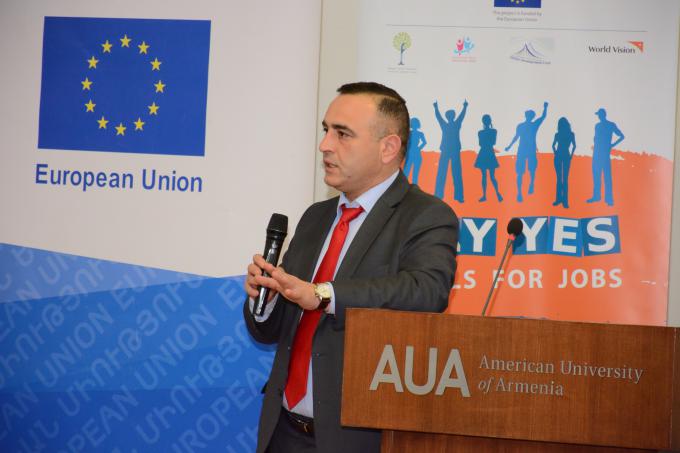 Armenia
Armenia
Languages
Young, educated and unemployed
Within the EU4Youth initiative, funded by the European Union, Save the Children International Armenian Representative Office and World Vision Armenia conducted three assessments of Armenia’s labour market. The findings of these research reports were presented during the event organized on the 27th of March.
The assessments particularly analyze the youth employment in Armenia from three following angles:
- The roles and prospects of young girls and boys in Armenia’s labour market,
- The obstacles of the Armenian youth on the way to labour market,
- Agriculture – available still not-desired sector to work in for Armenia’s youth.
Mr. Gonzalo Serrano Del La Rosa, Head of Cooperation Section at the European Union Delegation to the RA, states in his welcoming speech: “The results of those long-expected assessments will help us to gain more thorough knowledge of youth needs in Armenia. The youth employability issue, especially in the regions, is a priority for the European Union and the assessments represented today will contribute to its solution”.
Interestingly, 41% of Armenia’s youth is economically inactive and over one half of the inactive labour force (53.8%) are young people with higher education.
Only around 4% of the unemployed responnts are seeking jobs through the respective state employment offices, and 5% - through non-state employment offices. Around 13.9% of all current students surveyed and 18.1% of all employed young respondents stated that they did not obtain any soft skills, including general practical skills in communication, negotiations, analytics and leadership.
Though IT and tourism are considered to be developing fields for Armenia’s economy, the research shows that current teaching programs are not fit for private IT and Tourism sector standards: the private sector scores for the practical and theoretical knowledge of graduates are below moderate.
The interviews conducted as part of the research also revealed that fact that those certain privileges and mechanisms, expected to act as incentives for employers to hire more youths with disabilities, while are encouraging employers, are still inadequate and insufficient: 10.5% of employed respondents reported PWD working at their workplace, with only 3.4% in rural areas.

The assessments aim to provide a nationwide assessment of the needs of the current labour market with due consideration of today’s educational system, as well as analyze the compliance of the labour market demands with the skills and opportunities of the youth.
“The main findings of these assessments will help us provide evidence-based recommendations for the public policy reforms on education, employment and youth development”, says Astghik Movsisyan, Country Team Leader of the Save the Children International Armenian Representative Office.
The assessments have also revealed interesting data on the motivation of youth to pursue a career in the agricultural sector in Armenia: agriculture sector appears to be not very attractive among youth, notwithstanding the fact that it is the sole sector for the young people from rural communities to find a job. And still, young people need specialization to be competitive even in this sector.

The assessments are conducted within the “EU4Youth: Better Skills for Better Future” project implemented by the Save the Children International Armenian Representative Office and “EU4Youth: SAY YES — Skills for Jobs” project implemented by World Vision Armenia.
The assessments are available online:

